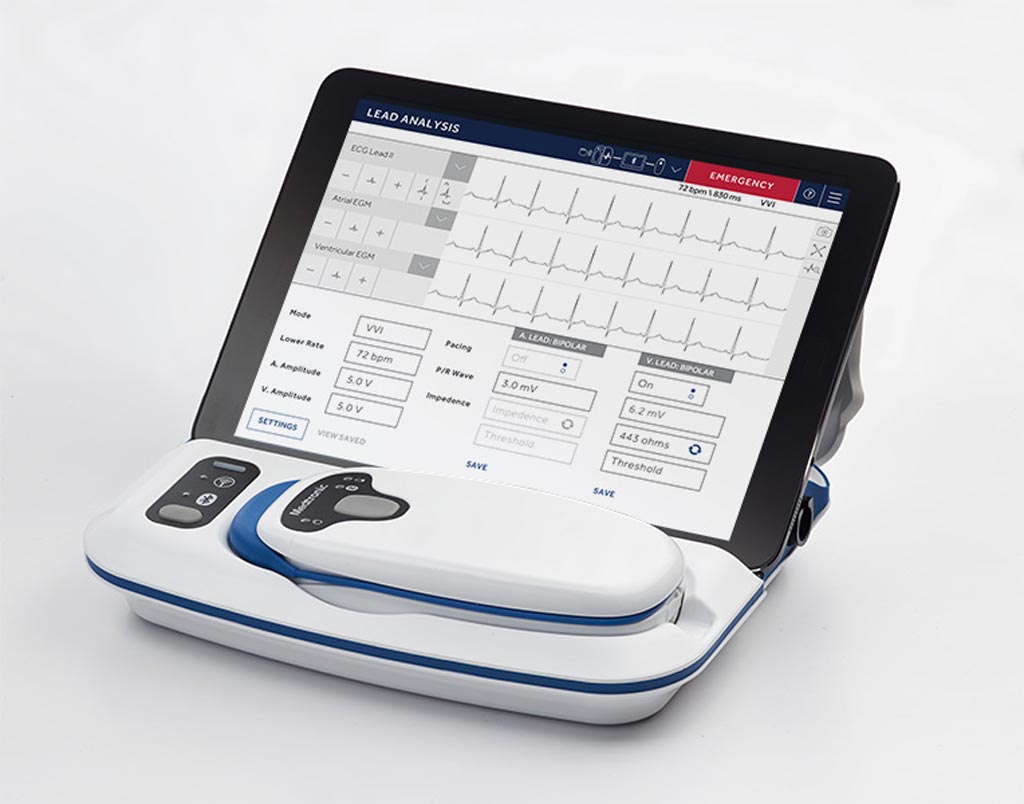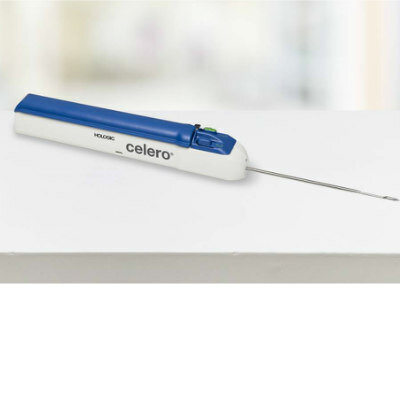iPad System Programs Implanted Pacemaker Devices
|
By HospiMedica International staff writers Posted on 28 May 2019 |

Image: The CareLink SmartSync, with base station, telemetry head and iPad controller (Photo courtesy of Medtronic).
A tablet-based management system provides portable and secure wireless programming of implanted cardiac devices (ICDs).
The Medtronic (Dublin, Ireland) CareLink SmartSync device manager is a next-generation programmer and pacing system analyzer that features a simplified user interface, enhanced security, and Bluetooth capabilities to communicate with compatible Medtronic BlueSync devices. The portable, wireless system allows physicians more freedom to engage with patients as they program and manage cardiac devices and device data. The SmartSync system includes the CareLink SmartSync mobile application, a patient connector (telemetry head), and a base station (pacing system analyzer).
SmartSync also includes the MyCareLink Heart mobile app, which allows patients to communicate with compatible BlueSync-enabled cardiac devices. In terms of security, the SmartSync device manager, similar to all of Medtronic’s BlueSync-enabled heart devices, comes with multi-encryption protocols, run-time application monitoring for intrusion detection security controls, and access restrictions to the device and data. BlueSync enabled Medtronic pacemakers include the Azure and Percepta pacemakers, and the Serena and Solara quadripolar cardiac resynchronization therapy pacemakers (CRT-Ps).
“Medtronic is committed to developing smart technology solutions that help physicians seamlessly provide high-quality care to cardiac patients,” said Rob Kowal, MD, PhD, chief medical officer of the Cardiac Rhythm and Heart Failure division at Medtronic. “SmartSync is another important innovation reinforcing that commitment. Clinicians will benefit from the portability that SmartSync offers, and because it was built to replicate the familiar CareLink 2090 interface, the transition to this new technology is quite simple.”
“The wireless capabilities and data transfer options of the SmartSync Device Manager have increased my efficiency in the lab and allow me to interact with my patients and peers more directly without sacrificing performance,” said consultant cardiologist Klaus Witte, MD, FRCP, lead clinician for cardiology at the University of Leeds (United Kingdom) and Leeds Teaching Hospitals NHS Trust (United Kingdom). “This type of portable device programing represents the future of cardiac data technology.”
The Medtronic (Dublin, Ireland) CareLink SmartSync device manager is a next-generation programmer and pacing system analyzer that features a simplified user interface, enhanced security, and Bluetooth capabilities to communicate with compatible Medtronic BlueSync devices. The portable, wireless system allows physicians more freedom to engage with patients as they program and manage cardiac devices and device data. The SmartSync system includes the CareLink SmartSync mobile application, a patient connector (telemetry head), and a base station (pacing system analyzer).
SmartSync also includes the MyCareLink Heart mobile app, which allows patients to communicate with compatible BlueSync-enabled cardiac devices. In terms of security, the SmartSync device manager, similar to all of Medtronic’s BlueSync-enabled heart devices, comes with multi-encryption protocols, run-time application monitoring for intrusion detection security controls, and access restrictions to the device and data. BlueSync enabled Medtronic pacemakers include the Azure and Percepta pacemakers, and the Serena and Solara quadripolar cardiac resynchronization therapy pacemakers (CRT-Ps).
“Medtronic is committed to developing smart technology solutions that help physicians seamlessly provide high-quality care to cardiac patients,” said Rob Kowal, MD, PhD, chief medical officer of the Cardiac Rhythm and Heart Failure division at Medtronic. “SmartSync is another important innovation reinforcing that commitment. Clinicians will benefit from the portability that SmartSync offers, and because it was built to replicate the familiar CareLink 2090 interface, the transition to this new technology is quite simple.”
“The wireless capabilities and data transfer options of the SmartSync Device Manager have increased my efficiency in the lab and allow me to interact with my patients and peers more directly without sacrificing performance,” said consultant cardiologist Klaus Witte, MD, FRCP, lead clinician for cardiology at the University of Leeds (United Kingdom) and Leeds Teaching Hospitals NHS Trust (United Kingdom). “This type of portable device programing represents the future of cardiac data technology.”
Latest Critical Care News
- Novel Cannula Delivery System Enables Targeted Delivery of Imaging Agents and Drugs
- Ingestible Smart Capsule for Chemical Sensing in the Gut Moves Closer to Market
- Novel Intrabronchial Method Delivers Cell Therapies in Critically Ill Patients on External Lung Support
- Generative AI Technology Detects Heart Disease Earlier Than Conventional Methods
- Wearable Technology Predicts Cardiovascular Risk by Continuously Monitoring Heart Rate Recovery
- Wearable Health Monitoring Device Measures Gases Emitted from and Absorbed by Skin
- Groundbreaking Technology Rapidly Detects Airborne Influenza Viruses
- Handheld Device Could Transform Heart Disease Screening
- Flexible Semi-Autonomous Robot Could Deliver Medicine Inside Body

- Neurorestorative Treatment Strategies Hold Promise for Most Severe Forms of Epilepsy
- Gene Discovery Could Help Grow New Heart Arteries
- Study Discovers Invisible Transmission of Common Hospital-Associated Infection
- Non-Invasive Neuro-Ophthalmology Techniques Could Detect Brain Tumors Earlier
- Mass Manufactured Nanoparticles to Deliver Cancer Drugs Directly to Tumors
- World’s Smallest Pacemaker Fits Inside Syringe Tip

- AI-Powered, Internet-Connected Medical Devices to Revolutionize Healthcare, Finds Study
Channels
Surgical Techniques
view channel
Pioneering Sutureless Coronary Bypass Technology to Eliminate Open-Chest Procedures
In patients with coronary artery disease, certain blood vessels may be narrowed or blocked, requiring a stent or a bypass (also known as diversion) to restore blood flow to the heart. Bypass surgeries... Read more
Intravascular Imaging for Guiding Stent Implantation Ensures Safer Stenting Procedures
Patients diagnosed with coronary artery disease, which is caused by plaque accumulation within the arteries leading to chest pain, shortness of breath, and potential heart attacks, frequently undergo percutaneous... Read more
World's First AI Surgical Guidance Platform Allows Surgeons to Measure Success in Real-Time
Surgeons have always faced challenges in measuring their progress toward surgical goals during procedures. Traditionally, obtaining measurements required stepping out of the sterile environment to perform... Read morePatient Care
view channel
Portable Biosensor Platform to Reduce Hospital-Acquired Infections
Approximately 4 million patients in the European Union acquire healthcare-associated infections (HAIs) or nosocomial infections each year, with around 37,000 deaths directly resulting from these infections,... Read moreFirst-Of-Its-Kind Portable Germicidal Light Technology Disinfects High-Touch Clinical Surfaces in Seconds
Reducing healthcare-acquired infections (HAIs) remains a pressing issue within global healthcare systems. In the United States alone, 1.7 million patients contract HAIs annually, leading to approximately... Read more
Surgical Capacity Optimization Solution Helps Hospitals Boost OR Utilization
An innovative solution has the capability to transform surgical capacity utilization by targeting the root cause of surgical block time inefficiencies. Fujitsu Limited’s (Tokyo, Japan) Surgical Capacity... Read more
Game-Changing Innovation in Surgical Instrument Sterilization Significantly Improves OR Throughput
A groundbreaking innovation enables hospitals to significantly improve instrument processing time and throughput in operating rooms (ORs) and sterile processing departments. Turbett Surgical, Inc.... Read moreHealth IT
view channel
Printable Molecule-Selective Nanoparticles Enable Mass Production of Wearable Biosensors
The future of medicine is likely to focus on the personalization of healthcare—understanding exactly what an individual requires and delivering the appropriate combination of nutrients, metabolites, and... Read more
Smartwatches Could Detect Congestive Heart Failure
Diagnosing congestive heart failure (CHF) typically requires expensive and time-consuming imaging techniques like echocardiography, also known as cardiac ultrasound. Previously, detecting CHF by analyzing... Read moreBusiness
view channel
Expanded Collaboration to Transform OR Technology Through AI and Automation
The expansion of an existing collaboration between three leading companies aims to develop artificial intelligence (AI)-driven solutions for smart operating rooms with sophisticated monitoring and automation.... Read more
















